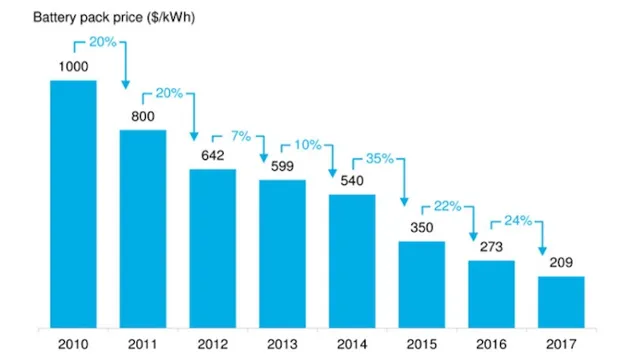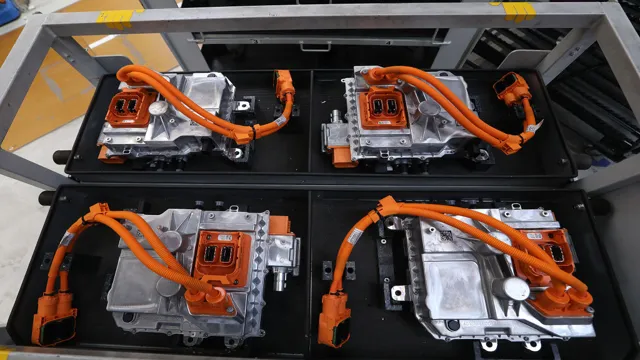Revolutionizing the Road: Bloomberg New Energy Finance (BNEF) Unveils the Future of Electric Car Batteries
Electric cars are becoming increasingly popular due to their environmental friendliness and pocket-friendly maintenance costs. The popularity of electric vehicles would not have been possible without the advancement of batteries, which is the backbone of electric vehicles. Today, the current battery technology is preventing electric cars from being the ultimate answer to our transportation needs.
However, the future of electric car technology seems promising, thanks to the exciting developments in electric car batteries. In the past, electric cars were not a common sight on the roads, mainly because the batteries were big, heavy, and expensive. However, with the advancement of technology, batteries that are smaller and lighter have been created.
They can deliver more power, a longer range, and have a faster charging time. With these developments, the inconvenience of using electric vehicles will soon be a thing of the past. The future of electric vehicle batteries is expected to bring major changes to the automobile industry.
One of the most significant changes that we expect is in relation to recyclability. Researchers continue to develop batteries that are both eco-friendly and capable of being recycled efficiently. This will be an essential factor as electric vehicles become more popular.
Another exciting development expected in the future of electric vehicle batteries is the use of flexible batteries. These batteries would potentially allow for the design of cars to be curvier and sleeker with a lot more interior and cargo space. That’s not the end; flexible batteries also open up the possibility of using electric power in the aviation industry, making our skies cleaner and air travel more sustainable.
Moreover, some researchers are working on solid-state batteries, which would be safer than the current liquid-electrolyte batteries. With no electrolyte, solid-state batteries would be less prone to short-circuiting, reducing the risk of fires and explosions. In conclusion, the future of electric vehicle batteries is bright, and ongoing developments are providing a very promising outlook.
Overview of Bloomberg New Energy Finance (BNEF)
Bloomberg New Energy Finance, commonly known as BNEF, is a research institute that provides insights on the fast-evolving energy transition in the world today. The company provides analysis and forecasting of the global energy transformation, including the development of electric car batteries and the adoption of renewable energy. BNEF is well-known for its analytical coverage of the clean energy market, with a focus on the latest and most essential industry trends.
The company also provides information on energy policy developments across the world to guide policymakers and investors in making informed decisions. With a team of over 200 analysts based in 6 continents, BNEF is continually working to provide up-to-date information, analysis, and insights on the latest happenings in the energy industry to foster a transition to a cleaner, more sustainable energy future.
What BNEF Says About Electric Car Batteries
BNEF, electric car batteries Bloomberg New Energy Finance (BNEF) has recently predicted that electric car batteries will become even cheaper by 2023, making electric cars more affordable and driving their sales to new heights. According to BNEF, there will be a significant increase in battery manufacturing capacity, allowing for economies of scale and reducing production costs. They also believe that advances in technology will lead to longer-lasting batteries with lighter weight and smaller size, which will increase the range and efficiency of electric vehicles.
BNEF’s analysis shows that the cost of batteries will decline by 77% from 2016 to 2030, and the electric vehicle market will reach 54 million annual sales by 2040. This is great news for the environment as more people shift to electric cars, reducing greenhouse gas emissions and improving air quality. With these promising developments in battery technology and affordability, the switch to electric vehicles is becoming more accessible and practical for everyday consumers.
Recent Developments with Electric Car Batteries
In recent years, there have been significant advancements made in the field of electric car batteries, which has led to increased performance and range. One of the most highly regarded sources of information on this topic is the Bloomberg New Energy Finance (BNEF). BNEF provides detailed analysis on the latest trends and technology developments in battery production, as well as forecasts on future market growth and demand for electric vehicles.
This is particularly important as more and more automakers shift towards producing electric models. BNEF’s research has shown that lithium-ion batteries remain the dominant technology for EVs, but there are many other types of battery chemistries that are being developed to improve upon their performance. The BNEF also predicts that the cost of battery production will decrease significantly in the coming years, which will further drive EV adoption and growth.
Overall, the BNEF plays a crucial role in shaping the future of electric car batteries, and their research is highly valued by automakers and investors alike.
Benefits of Electric Car Batteries
According to Bloomberg New Energy Finance (BNEF), electric car batteries offer several benefits. These batteries are more energy-efficient and have a longer lifespan than traditional lead-acid batteries. They also have a smaller carbon footprint and emit fewer toxic chemicals.
Additionally, electric car batteries are recyclable and can be reconditioned for use in other products. Moreover, the cost of electric car batteries is rapidly declining, making electric cars more affordable for consumers. BNEF predicts that the demand for electric cars will increase significantly in the coming years, making electric car batteries a crucial component for a cleaner and sustainable future.
Reduced Carbon Footprint
The reduced carbon footprint is one of the most significant benefits of electric car batteries. Unlike traditional petrol cars, electric cars produce zero emissions on the road. The batteries that power them use clean energy sources like solar and wind, which greatly lowers their carbon footprint.
This not only helps the environment but also contributes to sustainable development. While traditional cars emit harmful pollutants that contribute to global warming, electric cars have a much smaller impact on the environment. Moreover, electric car owners can significantly reduce their carbon footprint by charging their vehicles with renewable energy sources like solar panels or wind turbines.
By making the switch to an electric car, owners can help reduce their carbon footprint and help create a cleaner, healthier environment for future generations. So if you’re looking for a way to reduce your environmental impact, an electric car with a battery powered by clean energy might just be the way to go.
Lower Overall Cost of Ownership
One of the biggest benefits of electric car batteries is their lower overall cost of ownership compared to traditional gas-powered vehicles. While electric cars may have a higher upfront cost, the savings over time can be significant. One reason for this is the cost of fuel.
Electric cars can be charged for a fraction of the cost of gasoline, leading to substantial savings over the life of the vehicle. Additionally, electric car batteries require less maintenance than traditional engines since they have far fewer moving parts. This means fewer trips to the mechanic and lower maintenance costs overall.
Finally, electric cars usually come with longer warranties for their batteries, ensuring that you’ll save on replacement costs if anything goes wrong. So, while electric cars may seem like a pricey investment, the lower cost of ownership makes them a smart choice for your wallet and the environment in the long run.
Improved Performance and Efficiency
An electric car battery is more than just a device that powers your vehicle. It offers a range of benefits, including improved performance and efficiency. One of the main advantages of electric car batteries is their instant torque delivery.
This means that electric cars can deliver power to their wheels more efficiently, resulting in faster acceleration and smoother driving experience. Additionally, electric car batteries are more efficient than gasoline engines. They convert up to 80% of their energy into motion, compared to only 20% for gasoline engines.
This not only means that electric cars require less fuel to operate, but also waste less energy, which makes them more environmentally friendly. Overall, electric car batteries are an excellent choice for those who are looking for a more efficient and powerful driving experience.
Challenges Ahead for Electric Car Batteries
According to a recent report by Bloomberg New Energy Finance (BNEF), the future of electric car batteries faces significant challenges. While battery costs have decreased significantly in recent years, the report highlights potential issues with the supply chain for raw materials such as lithium and cobalt. Additionally, the demand for EV batteries is expected to skyrocket, which could put a strain on manufacturing and production capacity.
Lastly, the report points out that the current recycling infrastructure for EV batteries is not yet developed, which could lead to issues with disposal and an increase in environmental waste. Despite these challenges, BNEF remains optimistic about the future of electric car batteries and predicts that continued innovation and investment in the EV market will lead to further advancements in battery technology. As the transition to electric vehicles continues, addressing these challenges will be critical to ensure a sustainable and successful future for the industry.
Limited Range and Charging Infrastructure
Electric car batteries have made impressive strides in terms of efficiency and performance, but there are still challenges ahead for the industry. One major issue is the limited range of these batteries and the lack of charging infrastructure to support long-distance travel. While many electric cars can travel up to 300 miles on a single charge, this is still far less than the average gas-powered car.
Additionally, the charging infrastructure across the country is still developing, with many areas lacking in charging stations. As a result, electric car owners often have to carefully plan their routes to ensure they have access to charging stations along the way. However, with advancements in battery technology and infrastructure development, it is likely that these challenges will be addressed in the near future, making electric vehicles a more viable and convenient option for drivers.
Battery Durability and Recycling
Electric Car Battery Durability and Recycling As the world moves towards a more eco-friendly future, electric cars are growing in popularity due to their reduced carbon emissions compared to gas-powered vehicles. However, the durability and recycling of electric car batteries are major challenges that need to be addressed. Although electric car batteries have a longer lifespan than traditional car batteries, they still degrade over time and may need replacement.
The cost of battery replacement can be significant, and the disposal of the old batteries is an environmental concern. To combat this, battery manufacturers are investing in research to improve battery durability and recycling. One approach is to develop batteries that can be easily disassembled, allowing for the reuse or recycling of individual parts.
There are also efforts to develop batteries that are less reliant on rare materials, making them easier and cheaper to recycle. Another method is to repurpose old electric car batteries for alternative energy storage. Once the batteries can no longer power a car, they can still be used for a variety of other applications.
This includes storing energy from solar panels or wind turbines and providing backup power during an outage. In conclusion, electric car battery durability and recycling are challenges that need to be addressed as the demand for electric cars grows. However, the industry is making strides towards more sustainable solutions, such as investing in better battery technology and repurposing old batteries.
As a consumer, it is important to consider the environmental impact of an electric car’s battery and ensure proper disposal or recycling of the battery when the time comes.
The Impact of Electric Car Batteries on the Automotive Industry
Electric car batteries are revolutionizing the automotive industry, and Bloomberg New Energy Finance (BNEF) predicts that they will continue to do so in the years to come. These batteries have the potential to transform the way we drive and the source of power that fuels our transportation systems. By producing less pollution than traditional gasoline-powered cars, they have the potential to create a cleaner environment for future generations.
Additionally, electric cars are expected to become much cheaper as battery technology improves, making them a more affordable option for the average consumer. BNEF has predicted that the wholesale cost of electric car batteries will fall by around 16% per year until at least 202 This trend is likely to drive up demand for electric vehicles, which could eventually make electric cars the norm rather than the exception.
Conclusion
Bloomberg New Energy Finance’s research on electric car batteries has electrified the automotive industry. As technology continues to advance and prices drop, the prospect of a fully electric transportation sector looms larger than ever before. With a charge that lasts longer and is more cost-effective than ever before, the future of driving is looking green and exciting.
Buckle up, it’s going to be quite the ride!”
FAQs
What is Bloomberg New Energy Finance (BNEF)?
Bloomberg New Energy Finance (BNEF) is a research organization that provides analysis and insight into the global energy transition. They provide market intelligence, data, and news on the renewable energy and cleantech sectors.
How is BNEF involved in the electric car market?
BNEF tracks and analyzes data on the electric vehicle market, including trends in electric vehicle sales and the development of new battery technology. They also provide forecasts for the future growth of the electric vehicle market.
What is the current state of the electric car battery market?
The electric car battery market is rapidly evolving, with new technologies and improvements in battery capacity and cost. BNEF predicts that the market for electric car batteries will reach $116 billion by 2030, with a significant increase in battery capacity and improved charging infrastructure.
How is BNEF helping to promote the adoption of electric vehicles?
BNEF provides research, analysis, and insights to policymakers, automakers, and energy companies to help promote the growth of the electric vehicle market. They also hold events and conferences to promote the adoption of electric vehicles and encourage innovation in the electric vehicle industry.







